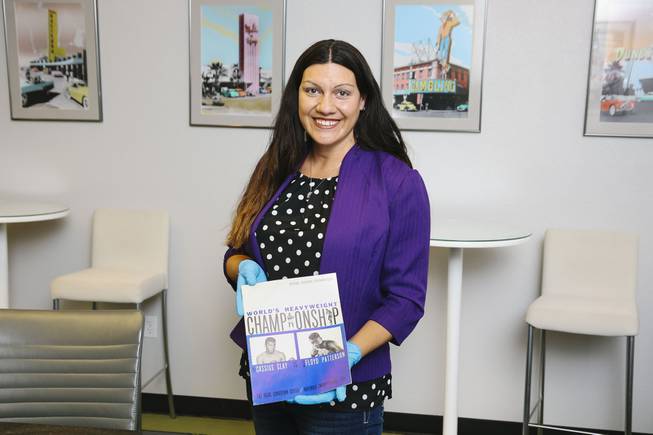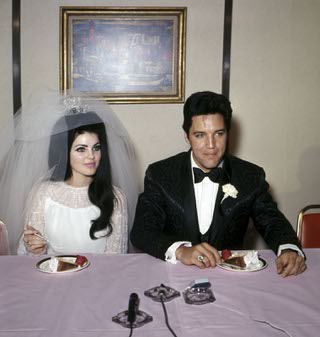
Kelli Luchs, archivist for the Las Vegas Convention and Visitors Authority, shows a 1965 program for a Cassius Clay vs. Floyd Patterson fight at the Las Vegas Convention Center Monday, Nov. 1, 2021.
Thursday, Nov. 4, 2021 | 2 a.m.
It’s not often Las Vegas — sometimes referred to as Sin City — is talked about in the same breath as a Catholic saint.
Then again, it’s not every day the curtain is pulled back on one of the most extensive collections of historical Las Vegas photos in existence.
Kelli Luchs, who came to Las Vegas from Michigan about 15 years ago to attend graduate school at UNLV, is charged with caring for the collection, which includes over 7 million photos taken over the years by the Las Vegas News Bureau.
The massive collection — which is being digitized to save it for future generations — is kept in an off-limits, temperature-controlled vault inside the Las Vegas Convention Center complex.
Though Luchs has gone through hundreds of thousands of photos, her favorite is of Mother Teresa of Calcutta during a visit to Las Vegas in 1960.
The photo shows Mother Teresa, nearly 50 at the time and wearing her familiar veil, sitting at a table looking off in the distance to her left.
Luchs stumbled upon the photo, labeled as “Sister Teresa,” about four years ago, about a year after Mother Teresa was canonized by the Roman Catholic Church as St. Teresa of Calcutta.
“When I saw the name on the envelope, I wondered, but I didn’t think it could be her,” Luchs said. “I didn’t know anything about Mother Teresa ever being in Las Vegas.”
Luchs confirmed through the Mother Teresa Center that the famous humanitarian was in Southern Nevada for a Catholic women’s conference in 1960.
“It was actually an important time in her life,” Luchs said. “It was the first time she had ever left India, and it was to come right here to Las Vegas. It gave me goosebumps.”
The possibility Luchs might discover something amazing any day she comes to work is one of the main reasons she jumped at the chance to apply for the position eight years ago.
Much of her job revolves around organizing and cataloging millions of photographic negatives, films and VHS tapes.
One of Luchs’ mains duties is preserving the negatives after they are digitized by freezing them, which can save them for up to 500 years, she said. So far, about 10,000 negatives have been frozen.
“In 20 or 30 years, when the next new technology comes out, we’ll have those frozen negatives and they’ll be in great shape,” Luchs said.
The pictures are the work of News Bureau photographers, who have been documenting the city’s colorful history since 1947 for marketing purposes.
The collection was once the property of the Vegas Chamber, but it went under the umbrella of the Las Vegas Convention and Visitors Authority in 1992.
“It was so exciting to walk into the vault for the first time,” Luchs said. “You get excited about Las Vegas when you look at this stuff, and I want that to be true for generations to come. Vegas is always exciting. It doesn’t matter who you are or what age you are.”
The collection includes photos of the Rat Pack, Elvis Presley relaxing at a pool with friends, Liberace, President John F. Kennedy in Las Vegas just months before his assassination in 1963 and Muhammad Ali — then Cassius Clay — working out before his fight with Floyd Patterson at the old Las Vegas Convention Center. It also has old convention brochures, fight programs and ticket stubs.
A few years ago, Luchs discovered an invitation-only ticket to Kennedy’s appearance at the convention center in September 1963.
Another of Luchs’ favorite items is a program for the Clay vs. Patterson heavyweight championship fight in November 1965, which is in near-perfect condition.
“A ringside ticket was $100 in 1965, which would be around $900 in today’s dollars. It’s also funny to look at the old advertising materials because so many of them mention air conditioning for the hotels. It’s a look back in time,” she said.
Through the years, the LVCVA has gotten requests for materials from authors, moviemakers and marketers far and wide. And assets from the collection are sometimes made public as exhibits.
In February, in conjunction with local sign company YESCO, which is celebrating its 100th anniversary, and the Neon Museum, some assets from the collection will be available for viewing at the Nevada Humanities Program Gallery.
The LVCVA also will mark the News Bureau’s 75th anniversary next year. Plans for that occasion have not been finalized.
Hollis J. Gillespie, director of the Nevada State Museum in Las Vegas, said she and her staff worked with the News Bureau and with UNLV special collections to compare items.
“Anytime you have a record of history, you have a window into a possible future,” Gillespie said. “Las Vegas is unlike any other city in the world, and these pieces help tell the story of who we are and what’s happened here over the years. Years from now, people will be looking at a Bruno Mars or Sting archive. Keeping a record of our history helps us have meaning, and meaning is important.”
And for Luchs, every piece of the collection has meaning.
Along the way, she’s stumbled upon some other items she cherishes — a short video clip of Sammy Davis Jr., performing before he lost his left eye in a car crash in 1954, and a color photo of Presley and his bride, Priscilla Beaulieu, in 1967 at the Aladdin.
“I have the best job in the world,” Luchs said. “You can’t help but love this job. I never know what I’m going to find. When I found that Sammy Davis Jr. clip with sound, I yelled ‘look what I found’ to my co-workers. Las Vegas is fantastic, and so is this collection.”

